- Home
- David Sedaris
Children Playing Before a Statue of Hercules Page 2
Children Playing Before a Statue of Hercules Read online
Page 2
We had just turned off the radio one day when we went out into the studio and found our mother discussing the Roosevelt project with Howard Whitman. It was the first we’d heard of it, and we must have interrupted her with too many questions because she said, “Edith? Billy? That’s enough, now. I’ll tell you all about this later. Run out in the garden and play.”
She always called the courtyard “the garden,” though nothing grew there except a few stunted city trees and a patch of grass that never had a chance to spread. Mostly it was bald earth, interrupted here and there by brick paving, lightly powdered with soot and scattered with the droppings of dogs and cats. It may have been six or eight houses long, but it was only two houses wide, which gave it a hemmed-in, cheerless look; its only point of interest was a dilapidated marble fountain, not much bigger than a birdbath, which stood near our house. The original idea of the fountain was that water would drip evenly from around the rim of its upper tier and tinkle into its lower basin, but age had unsettled it; the water spilled in a single ropy stream from the only inch of the upper tier’s rim that stayed clean. The lower basin was deep enough to soak your feet in on a hot day, but there wasn’t much pleasure in that because the underwater part of the marble was coated with brown scum.
My sister and I found things to do in the courtyard every day, for all of the two years we lived there, but that was only because Edith was an imaginative child. She was eleven at the time of the Roosevelt project, and I was seven.
“Daddy?” she asked in our father’s office uptown one afternoon. “Have you heard Mommy’s doing a head of President Roosevelt?”
“Oh?” He was rummaging in his desk, looking for something he’d said we might like.
“She’s going to take his measurements and stuff here in New York,” Edith said, “and then after the Inauguration, when the sculpture’s done, she’s going to take it to Washington and present it to him in the White House.” Edith often told one of our parents about the other’s more virtuous activities; it was part of her long, hopeless effort to bring them back together. Many years later she told me she thought she had never recovered, and never would, from the shock of their breakup: she said Hastings-on-Hudson remained the happiest time of her life, and that made me envious because I could scarcely remember it at all.
“Well,” my father said. “That’s really something, isn’t it.” Then he found what he’d been looking for in the desk and said, “Here we go; what do you think of these?” They were two fragile perforated sheets of what looked like postage stamps, each stamp bearing the insignia of an electric lightbulb in vivid white against a yellow background, and the words “More light.”
My father’s office was one of many small cubicles on the twenty-third floor of the General Electric building. He was an assistant regional sales manager in what was then called the Mazda Lamp Division—a modest job, but good enough to have allowed him to rent into a town like Hastings-on-Hudson in better times—and these “More light” stamps were souvenirs of a recent sales convention. We told him the stamps were neat—and they were—but expressed some doubt as to what we might do with them.
“Oh, they’re just for decoration,” he said. “I thought you could paste them into your schoolbooks, or—you know—whatever you want. Ready to go?” And he carefully folded the sheets of stamps and put them in his inside pocket for safekeeping on the way home.
Between the subway exit and the courtyard, somewhere in the West Village, we always walked past a vacant lot where men stood huddled around weak fires built of broken fruit crates and trash, some of them warming tin cans of food held by coat-hanger wire over the flames. “Don’t stare,” my father had said the first time. “All those men are out of work, and they’re hungry.”
“Daddy?” Edith inquired. “Do you think Roosevelt’s good?”
“Sure I do.”
“Do you think all the Democrats are good?”
“Well, most of ’em, sure.”
Much later I would learn that my father had participated in local Democratic Party politics for years. He had served some of his political friends—men my mother described as dreadful little Irish people from Tammany Hall—by helping them to establish Mazda Lamp distributorships in various parts of the city. And he loved their social gatherings, at which he was always asked to sing.
“Well, of course, you’re too young to remember Daddy’s singing,” Edith said to me once after his death in 1942.
“No, I’m not; I remember.”
“But I mean really remember,” she said. “He had the most beautiful tenor voice I’ve ever heard. Remember ‘Danny Boy’?”
“Sure.”
“Ah, God, that was something,” she said, closing her eyes. “That was really—that was really something.”
When we got back to the courtyard that afternoon, and back into the studio, Edith and I watched our parents say hello to each other. We always watched that closely, hoping they might drift into conversation and sit down together and find things to laugh about, but they never did. And it was even less likely than usual that day because my mother had a guest—a woman named Sloane Cabot who was her best friend in the courtyard, and who greeted my father with a little rush of false, flirtatious enthusiasm.
“How’ve you been, Sloane?” he said. Then he turned back to his former wife and said, “Helen? I hear you’re planning to make a bust of Roosevelt.”
“Well, not a bust,” she said. “A head. I think it’ll be more effective if I cut it off at the neck.”
“Well, good. That’s fine. Good luck with it. Okay, then.” He gave his whole attention to Edith and me. “Okay. See you soon. How about a hug?”
And those hugs of his, the climax of his visitation rights, were unforgettable. One at a time we would be swept up and pressed hard into the smells of linen and whiskey and tobacco; the warm rasp of his jaw would graze one cheek and there would be a quick moist kiss near the ear; then he’d let us go.
He was almost all the way out of the courtyard, almost out in the street, when Edith and I went racing after him.
“Daddy! Daddy! You forgot the stamps!”
He stopped and turned around, and that was when we saw he was crying. He tried to hide it—he put his face nearly into his armpit as if that might help him search his inside pocket—but there is no way to disguise the awful bloat and pucker of a face in tears.
“Here,” he said. “Here you go.” And he gave us the least convincing smile I had ever seen. It would be good to report that we stayed and talked to him—that we hugged him again—but we were too embarrassed for that. We took the stamps and ran home without looking back.
“Oh, aren’t you excited, Helen?” Sloane Cabot was saying. “To be meeting him, and talking to him and everything, in front of all those reporters?”
“Well, of course,” my mother said, “but the important thing is to get the measurements right. I hope there won’t be a lot of photographers and silly interruptions.”
Sloane Cabot was some years younger than my mother, and strikingly pretty in a style often portrayed in what I think are called Art Deco illustrations of that period: straight dark bangs, big eyes, and a big mouth. She too was a divorced mother, though her former husband had vanished long ago and was referred to only as “that bastard” or “that cowardly son of a bitch.” Her only child was a boy of Edith’s age named John, whom Edith and I liked enormously.
The two women had met within days of our moving into the courtyard, and their friendship was sealed when my mother solved the problem of John’s schooling. She knew a Hastings-on-Hudson family who would appreciate the money earned from taking in a boarder, so John went up there to live and go to school, and came home only on weekends. The arrangement cost more than Sloane could comfortably afford, but she managed to make ends meet and was forever grateful.
Sloane worked in the Wall Street district as a private secretary. She talked a lot about how she hated her job and her boss, but the good part was that her boss w
as often out of town for extended periods: that gave her time to use the office typewriter in pursuit of her life’s ambition, which was to write scripts for the radio.
She once confided to my mother that she’d made up both of her names: “Sloane” because it sounded masculine, the kind of name a woman alone might need for making her way in the world, and “Cabot” because—well, because it had a touch of class. Was there anything wrong with that?
“Oh, Helen,” she said. “This is going to be wonderful for you. If you get the publicity—if the papers pick it up, and the newsreels—you’ll be one of the most interesting personalities in America.”
Five or six people were gathered in the studio on the day my mother came home from her first visit with the President-elect.
“Will somebody get me a drink?” she asked, looking around in mock helplessness. “Then I’ll tell you all about it.”
And with the drink in her hand, with her eyes as wide as a child’s, she told us how a door had opened and two big men had brought him in.
“Big men,” she insisted. “Young, strong men, holding him up under the arms, and you could see how they were straining. Then you saw this foot come out, with these awful metal braces on the shoe, and then the other foot. And he was sweating, and he was panting for breath, and his face was—I don’t know—all bright and tense and horrible.” She shuddered.
“Well,” Howard Whitman said, looking uneasy, “he can’t help being crippled, Helen.”
“Howard,” she said impatiently, “I’m only trying to tell you how ugly it was.” And that seemed to carry a certain weight. If she was an authority on beauty—on how a little boy might kneel among ferns to play the pipes of Pan, for example—then surely she had earned her credentials as an authority on ugliness.
“Any way,” she went on, “they got him into a chair, and he wiped most of the sweat off his face with a handkerchief—he was still out of breath—and after a while he started talking to some of the other men there; I couldn’t follow that part of it. Then finally he turned to me with this smile of his. Honestly, I don’t know if I can describe that smile. It isn’t something you can see in the newsreels; you have to be there. His eyes don’t change at all, but the corners of his mouth go up as if they’re being pulled by puppet strings. It’s a frightening smile. It makes you think: this could be a dangerous man. This could be an evil man. Well anyway, we started talking, and I spoke right up to him. I said, ‘I didn’t vote for you, Mr. President.’ I said, ‘I’m a good Republican and I voted for President Hoover.’ He said, ‘Why are you here, then?’ or something like that, and I said, ‘Because you have a very interesting head.’ So he gave me the smile again and he said, ‘What’s interesting about it?’ And I said, ‘I like the bumps on it.’ ”
By then she must have assumed that every reporter in the room was writing in his notebook, while the photographers got their flashbulbs ready; tomorrow’s papers might easily read:
GAL SCULPTOR TWITS FDR
ABOUT “BUMPS” ON HEAD
At the end of her preliminary chat with him she got down to business, which was to measure different parts of his head with her calipers. I knew how that felt: the cold, trembling points of those clay-encrusted calipers had tickled and poked me all over during the times I’d served as model for her fey little woodland boys.
But not a single flashbulb went off while she took and recorded the measurements, and nobody asked her any questions; after a few nervous words of thanks and goodbye she was out in the corridor again among all the hopeless, craning people who couldn’t get in. It must have been a bad disappointment, and I imagine she tried to make up for it by planning the triumphant way she’d tell us about it when she got home.
“Helen?” Howard Whitman inquired, after most of the other visitors had gone. “Why’d you tell him you didn’t vote for him?”
“Well, because it’s true. I am a good Republican; you know that.”
She was a storekeeper’s daughter from a small town in Ohio; she had probably grown up hearing the phrase “good Republican” as an index of respectability and clean clothes. And maybe she had come to relax her standards of respectability, maybe she didn’t even care much about clean clothes anymore, but “good Republican” was worth clinging to. It would be helpful when she met the customers for her garden figures, the people whose low, courteous voices would welcome her into their lives and who would almost certainly turn out to be Republicans too.
“I believe in the aristocracy!” she often cried, trying to make herself heard above the rumble of voices when her guests were discussing Communism, and they seldom paid her any attention. They liked her well enough: she gave parties with plenty of liquor, and she was an agreeable hostess if only because of her touching eagerness to please; but in any talk of politics she was like a shrill, exasperating child. She believed in the aristocracy.
She believed in God too, or at least in the ceremony of St. Luke’s Episcopal Church, which she attended once or twice a year. And she believed in Eric Nicholson, the handsome middle-aged Englishman who was her lover. He had something to do with the American end of a British chain of foundries: his company cast ornamental objects into bronze and lead. The cupolas of college and high-school buildings all over the East, the lead casement windows for Tudor-style homes in places like Scarsdale and Bronxville—these were some of the things Eric Nicholson’s firm had accomplished. He was always self-deprecating about his business, but ruddy and glowing with its success.
My mother had met him the year before, when she’d sought help in having one of her garden figures cast into bronze, to be “placed on consignment” with some garden-sculpture gallery from which it would never be sold. Eric Nicholson had persuaded her that lead would be almost as nice as bronze and much cheaper; then he’d asked her out to dinner, and that evening changed our lives.
Mr. Nicholson rarely spoke to my sister or me, and I think we were both frightened of him, but he overwhelmed us with gifts. At first they were mostly books—a volume of cartoons from Punch, a partial set of Dickens, a book called England in Tudor Times containing tissue-covered color plates that Edith liked. But in the summer of 1933, when our father arranged for us to spend two weeks with our mother at a small lake in New Jersey, Mr. Nicholson’s gifts became a cornucopia of sporting goods. He gave Edith a steel fishing rod with a reel so intricate that none of us could have figured it out even if we’d known how to fish, a wicker creel for carrying the fish she would never catch, and a sheathed hunting knife to be worn at her waist. He gave me a short ax whose head was encased in a leather holster and strapped to my belt—I guess this was for cutting firewood to cook the fish—and a cumbersome net with a handle that hung from an elastic shoulder strap, in case I should be called upon to wade in and help Edith land a tricky one. There was nothing to do in that New Jersey village except take walks, or what my mother called good hikes; and every day, as we plodded out through the insect-humming weeds in the sun, we wore our full regalia of useless equipment.
That same summer Mr. Nicholson gave me a three-year subscription to Field & Stream, and I think that impenetrable magazine was the least appropriate of all his gifts because it kept coming in the mail for such a long, long time after everything else had changed for us: after we’d moved out of New York to Scarsdale, where Mr. Nicholson had found a house with a low rent, and after he had abandoned my mother in that house—with no warning—to return to England and to the wife from whom he’d never really been divorced.
But all that came later; I want to go back to the time between Franklin D. Roosevelt’s election and his Inauguration, when his head was slowly taking shape on my mother’s modeling stand.
Her original plan had been to make it life-size, or larger than life-size, but Mr. Nicholson urged her to scale it down for economy in the casting, and so she made it only six or seven inches high. He persuaded her too, for the second time since he’d known her, that lead would be almost as nice as bronze.
She had
always said she didn’t mind at all if Edith and I watched her work, but we had never much wanted to; now it was a little more interesting because we could watch her sift through many photographs of Roosevelt cut from newspapers until she found one that would help her execute a subtle plane of cheek or brow.
But most of our day was taken up with school. John Cabot might go to school in Hastings-on-Hudson, for which Edith would always yearn, but we had what even Edith admitted was the next best thing: we went to school in our bedroom.
During the previous year my mother had enrolled us in the public school down the street, but she’d begun to regret it when we came home with lice in our hair. Then one day Edith came home accused of having stolen a boy’s coat, and that was too much. She withdrew us both, in defiance of the city truant officer, and pleaded with my father to help her meet the cost of a private school. He refused. The rent she paid and the bills she ran up were already taxing him far beyond the terms of the divorce agreement; he was in debt; surely she must realize he was lucky even to have a job. Would she ever learn to be reasonable?
It was Howard Whitman who broke the deadlock. He knew of an inexpensive, fully accredited mail-order service called the Calvert School, intended mainly for the homes of children who were invalids. The Calvert School furnished weekly supplies of books and materials and study plans; all she would need was someone in the house to administer the program and to serve as a tutor. And someone like Bart Kampen would be ideal for the job.
“The skinny fellow?” she asked. “The Jewish boy from Holland or wherever it is?”
“He’s very well educated, Helen,” Howard told her. “And he speaks fluent English, and he’d be very conscientious. And he could certainly use the money.”
We were delighted to learn that Bart Kampen would be our tutor. With the exception of Howard himself, Bart was probably our favorite among the adults around the courtyard. He was twenty-eight or so, young enough so that his ears could still turn red when he was teased by children; we had found that out in teasing him once or twice about such matters as that his socks didn’t match. He was tall and very thin and seemed always to look startled except when he was comforted enough to smile. He was a violinist, a Dutch Jew who had emigrated the year before in the hope of joining a symphony orchestra, and eventually of launching a concert career. But the symphonies weren’t hiring then, nor were lesser orchestras, so Bart had gone without work for a long time. He lived alone in a room on Seventh Avenue, not far from the courtyard, and people who liked him used to worry that he might not have enough to eat. He owned two suits, both cut in a way that must have been stylish in the Netherlands at the time: stiff, heavily padded shoulders and a nipped-in waist; they would probably have looked better on someone with a little more meat on his bones. In shirtsleeves, with the cuffs rolled back, his hairy wrists and forearms looked even more fragile than you might have expected, but his long hands were shapely and strong enough to suggest authority on the violin.

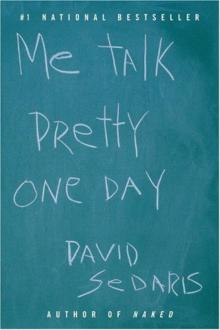 Me Talk Pretty One Day
Me Talk Pretty One Day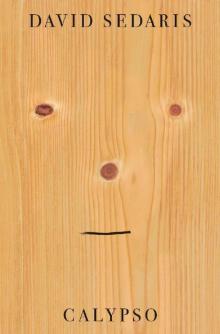 Calypso
Calypso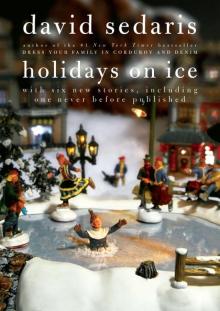 Holidays on Ice
Holidays on Ice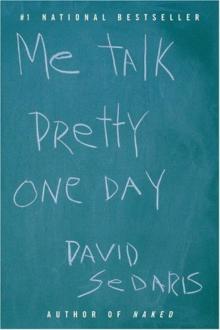 Mi vida en rose
Mi vida en rose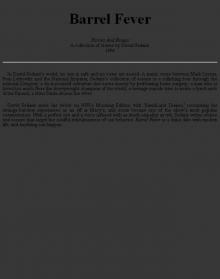 1994 - Barrel Fever
1994 - Barrel Fever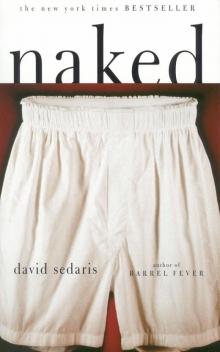 Naked
Naked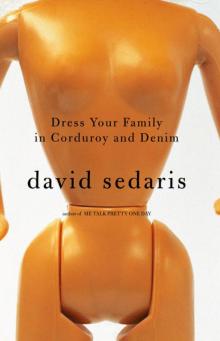 Dress Your Family in Corduroy and Denim
Dress Your Family in Corduroy and Denim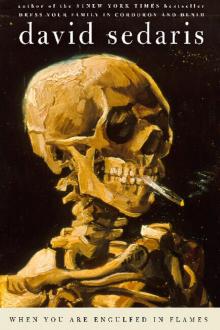 When You Are Engulfed in Flames
When You Are Engulfed in Flames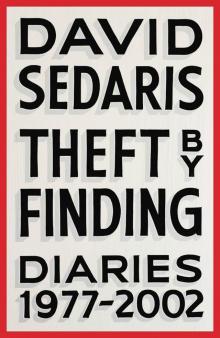 Theft by Finding: Diaries 1977-2002
Theft by Finding: Diaries 1977-2002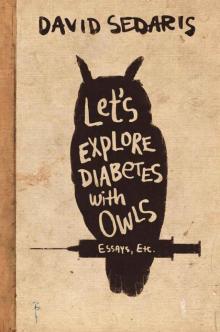 Let's Explore Diabetes With Owls
Let's Explore Diabetes With Owls Squirrel Seeks Chipmunk: A Modest Bestiary
Squirrel Seeks Chipmunk: A Modest Bestiary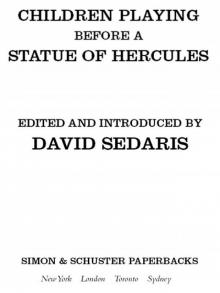 Children Playing Before a Statue of Hercules
Children Playing Before a Statue of Hercules The Best of Me
The Best of Me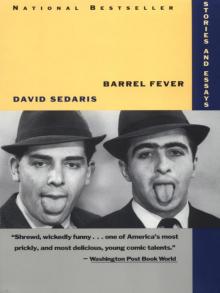 Barrel Fever
Barrel Fever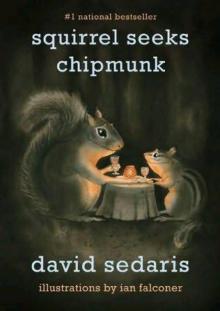 Squirrel Seeks Chipmunk
Squirrel Seeks Chipmunk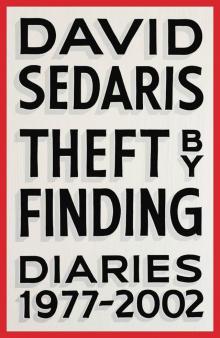 Theft by Finding
Theft by Finding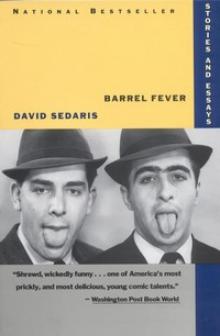 Barrel Fever and Other Stories
Barrel Fever and Other Stories